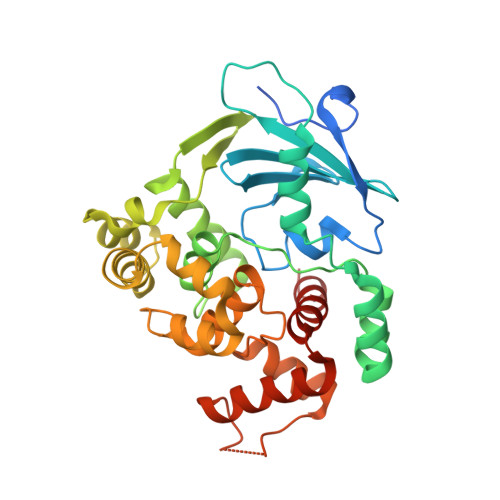Targeting OGG1 arrests cancer cell proliferation by inducing replication stress.
Visnes, T., Benitez-Buelga, C., Cazares-Korner, A., Sanjiv, K., Hanna, B.M.F., Mortusewicz, O., Rajagopal, V., Albers, J.J., Hagey, D.W., Bekkhus, T., Eshtad, S., Baquero, J.M., Masuyer, G., Wallner, O., Muller, S., Pham, T., Gokturk, C., Rasti, A., Suman, S., Torres-Ruiz, R., Sarno, A., Wiita, E., Homan, E.J., Karsten, S., Marimuthu, K., Michel, M., Koolmeister, T., Scobie, M., Loseva, O., Almlof, I., Unterlass, J.E., Pettke, A., Bostrom, J., Pandey, M., Gad, H., Herr, P., Jemth, A.S., El Andaloussi, S., Kalderen, C., Rodriguez-Perales, S., Benitez, J., Krokan, H.E., Altun, M., Stenmark, P., Berglund, U.W., Helleday, T.(2020) Nucleic Acids Res 48: 12234-12251
- PubMed: 33211885
- DOI: https://doi.org/10.1093/nar/gkaa1048
- Primary Citation of Related Structures:
6RLW - PubMed Abstract:
Altered oncogene expression in cancer cells causes loss of redox homeostasis resulting in oxidative DNA damage, e.g. 8-oxoguanine (8-oxoG), repaired by base excision repair (BER). PARP1 coordinates BER and relies on the upstream 8-oxoguanine-DNA glycosylase (OGG1) to recognise and excise 8-oxoG. Here we hypothesize that OGG1 may represent an attractive target to exploit reactive oxygen species (ROS) elevation in cancer. Although OGG1 depletion is well tolerated in non-transformed cells, we report here that OGG1 depletion obstructs A3 T-cell lymphoblastic acute leukemia growth in vitro and in vivo, validating OGG1 as a potential anti-cancer target. In line with this hypothesis, we show that OGG1 inhibitors (OGG1i) target a wide range of cancer cells, with a favourable therapeutic index compared to non-transformed cells. Mechanistically, OGG1i and shRNA depletion cause S-phase DNA damage, replication stress and proliferation arrest or cell death, representing a novel mechanistic approach to target cancer. This study adds OGG1 to the list of BER factors, e.g. PARP1, as potential targets for cancer treatment.
- Science for Life Laboratory, Department of Oncology and Pathology, Karolinska Institutet, S-171 76 Stockholm, Sweden.
Organizational Affiliation:

















